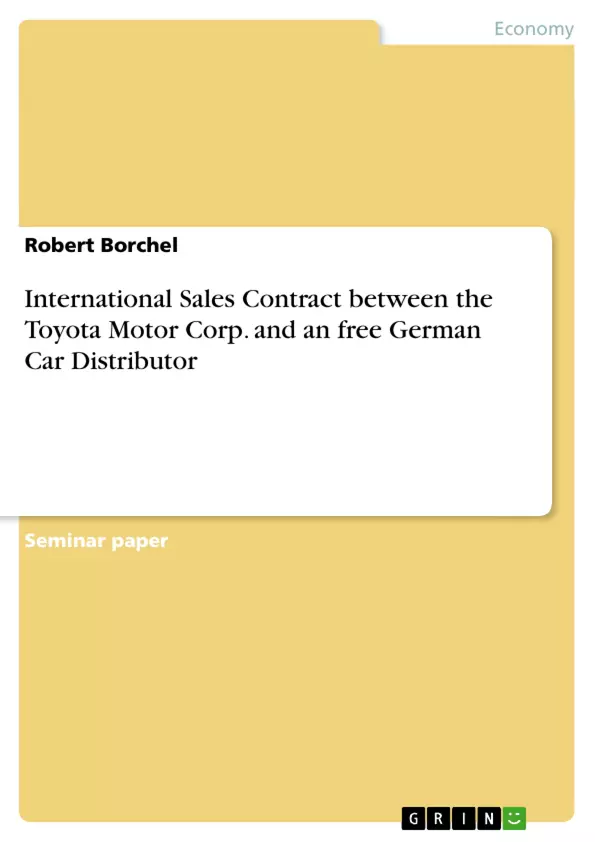The following assignment gives a review about contract-drafting and legal problems which have to be solved while international trading processes. The first part of the available assignment contains an introduction about the contract negotiations and explains what influence the INCOTERM 2000 had on the sales price. In the second part I show the contract, describe the way the goods will be transported, give an overview about the responsibilities for entering the contract with the carrier, show the body of law and the concerned judges in the case the carrier damage the goods and answer the question if the seller has the obligation to send new goods replacing the damaged. The legal problem definition is the main topic at the third part of this assignment and answers the three international private law problems (I.P.L.). With the fourth part I give a brief evaluation about our assignment.
Inhaltsverzeichnis (Table of Contents)
- List of abbreviations
- Executive Summary
- Negotiations
- Brief description
- Influence of the INCOTERMS 2000 on the price
- ICC International Sales contract
- Contract
- Transportation of the goods
- Bodies of Law & Jurisdiction
- Problem description & solution
- Which Body of Law?
- The Judge of which country?
- Can a court decision be executed in another country?
- Evaluation of the assignment
- Literature and Sources
Zielsetzung und Themenschwerpunkte (Objectives and Key Themes)
This assignment explores the complexities of international sales contracts and the legal issues that arise in global trade. It focuses on the specific case of a contract between Toyota Motor Corp. and a German car distributor for the sale of Toyota Prius cars.
- International sales contract negotiation
- The influence of INCOTERMS 2000 on pricing and responsibility
- Transportation and logistics in international trade
- Jurisdictional considerations and conflict of laws in international transactions
- Legal implications of damaged goods and potential remedies
Zusammenfassung der Kapitel (Chapter Summaries)
- Negotiations: This chapter introduces the scenario of an international sale between Toyota Motor Corp. and a German distributor. It highlights the significance of international sales contracts in global trade and briefly discusses the influence of INCOTERMS 2000 on the sales price.
- ICC International Sales contract: This chapter delves into the specific contract between Toyota and the German distributor. It outlines the key provisions of the agreement, including the transportation of goods, responsibilities of the parties, and relevant legal frameworks.
- Transportation of the goods: This chapter focuses on the logistics of transporting the Toyota Prius cars from Japan to Germany. It explores the responsibilities of the carrier, the legal framework governing the transportation process, and the implications of potential damage to the goods.
- Problem description & solution: This chapter addresses the legal challenges presented by the international sale, focusing on three key areas: determining the applicable body of law, identifying the competent court, and examining the enforceability of court decisions across borders.
Schlüsselwörter (Keywords)
This assignment focuses on key terms related to international sales contracts, including INCOTERMS 2000, international private law, jurisdictional considerations, conflict of laws, transportation and logistics, and legal remedies for damaged goods.
Frequently Asked Questions
What are INCOTERMS 2000 and why are they important?
INCOTERMS are standardized international commercial terms that define the responsibilities of buyers and sellers regarding delivery, risks, and costs. They directly influence the final sales price.
Which legal framework applies to an international sales contract?
Determining the "Body of Law" is a central problem in international private law (I.P.L.), often depending on the agreement between parties or the location of the seller/buyer.
What happens if goods are damaged during international transport?
The contract must define who bears the risk during transit, who is responsible for contracting the carrier, and whether the seller is obligated to replace damaged goods.
Can a court decision from one country be executed in another?
The assignment explores the enforceability of cross-border court decisions, which is a significant challenge in global trade jurisdiction.
What is the specific case study in this assignment?
The assignment analyzes a contract between Toyota Motor Corp. (Japan) and a free German car distributor for the sale of Toyota Prius cars.
- Citar trabajo
- Diplom Betriebswirt (FH) Robert Borchel (Autor), 2005, International Sales Contract between the Toyota Motor Corp. and an free German Car Distributor, Múnich, GRIN Verlag, https://www.grin.com/document/39782



